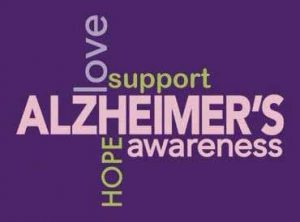 November is National Alzheimer’s Disease Awareness Month, designated by former President Ronald Reagan in 1983. The goal was to build more awareness and education about a disease that now affects 5 million people as well as the 16 million people who provide caregiver support for their spouse, parent or loved one.
November is National Alzheimer’s Disease Awareness Month, designated by former President Ronald Reagan in 1983. The goal was to build more awareness and education about a disease that now affects 5 million people as well as the 16 million people who provide caregiver support for their spouse, parent or loved one.
In honor of Alzheimer’s Awareness Month in November here are some quick facts regarding Alzheimer’s disease. By knowing the facts we can all help bring attention to the signs and symptoms of a disease that affects so many families in America.
What is Alzheimer’s?
- Alzheimer’s disease is an irreversible brain disorder that slowly destroys memory and thinking skills and eventually, the ability to carry out even simple tasks.
- Alzheimer’s is a progressive disease and symptoms gradually worsen over a number of years
- In most people, Alzheimer’s symptoms first appear in their mid-60s
- There is no cure, but there are treatments that can slow down its progression
Quick Facts
- Every 65 seconds someone in the United States develops Alzheimer’s disease
- Alzheimer’s is the sixth-leading cause of death in the United States
- Alzheimer’s causes more deaths than breast cancer and prostate cancer combined
- The estimated lifetime cost of care for someone living with dementia is $341,840
- Alzheimer’s takes a devastating toll on caregivers. Compared with caregivers of people without dementia, twice as many caregivers of those with dementia indicate substantial physical, emotional and financial difficulties.
Common Symptoms
- Memory loss
- Bad decision making or poor judgment
- Trouble solving problems such as making plans, following a recipe or managing finances
- Losing track of time or where they are and how they got there
- Misplacing things due to forgetfulness
- Changes in mood or personality or violent or aggressive behavior
- Withdrawal from work or social activities
Responding as a Caregiver
- Keep them on a daily routine
- Keep things simple and easy to understand
- Remain calm and never argue or yell
- Be reassuring and help them feel safe and comfortable
- Know that taking care of yourself is one of the most important things you can do as a caregiver. Make time for yourself.
Long-Term Care Options
Alzheimer’s is a disease that causes a slow decline in memory, thinking and reasoning ability. Sometimes a primary caregiver might not even notice this gradual decline in health or might not want to accept the fact that the health of their spouse or parent is declining. As the disease slowly progresses, however, providing constant care can often become too challenging for primary caregivers. One of the most difficult questions a primary caregiver must consider is, “Are their care needs beyond my abilities?” or “Is their health or my health as a caregiver at risk?” If the answer is yes to either of those questions, then it’s probably time to look for an assisted living community.
Deciding to move to assisted living is never easy, and caregiver guilt is a common reaction to having to move a family member out of their home. What’s more, trying to find the best place for your loved one can often be a difficult, confusing and time-consuming process. We have helped many families understand the many different types of care options for family members that suffer from Alzheimer’s or need long-term care. We can help you too.
As part of our assisted living placement service, we personally take you to visit the assisted living communities that we think are suitable for your loved one and together we go through a comprehensive list of questions until you are satisfied that you understand all the options, policies, and benefits that each assisted living community offers. Our service is provided at no cost to you. For a free consultation please contact us.


